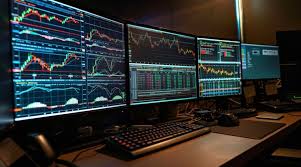Leverage is a crucial tool in trading, allowing traders to amplify their potential returns by controlling larger positions with less capital. While retail traders face strict leverage restrictions, proprietary trading firms offer significantly higher leverage, prop trading with greater flexibility and profit potential.
This article explores how higher leverage in proprietary trading enhances trading opportunities, increases efficiency, and maximizes returns while maintaining disciplined risk management.
1. What is Leverage in Trading?
Leverage allows traders to control a large market position with a relatively small amount of capital. It is expressed as a ratio, such as 10:1 or 50:1, indicating how much a trader can borrow relative to their own capital.
For example, with 10:1 leverage, a trader can control a $100,000 position with just $10,000 of their own capital. This magnifies both potential gains and losses, making effective risk management essential.
2. How Proprietary Trading Firms Provide Higher Leverage
Retail traders often face strict regulatory limits on leverage, which restricts their ability to maximize opportunities. Proprietary trading firms, however, offer significantly higher leverage by providing firm capital for trading.
Key advantages of higher leverage in proprietary trading include:
Larger Position Sizes: Traders can capitalize on bigger market movements with less capital.
Enhanced Profit Potential: Even small price fluctuations can generate significant returns.
Flexible Strategy Implementation: Traders can engage in intraday, swing, and algorithmic trading more effectively.
By offering higher leverage, proprietary firms empower traders to execute strategies that would be difficult to implement with personal funds alone.
3. Increased Market Exposure Without Personal Financial Risk
One of the biggest advantages of proprietary trading is that traders use firm capital rather than their own funds. This allows them to take on larger market positions without exposing personal assets to excessive risk.
Benefits of trading with firm capital and leverage:
No Personal Capital at Risk: Losses are absorbed by the firm, not the trader’s personal savings.
Ability to Scale Profitable Strategies: Traders can increase their trading volume without requiring additional personal investment.
Opportunity to Trade Various Markets: Higher leverage provides access to multiple asset classes, including stocks, forex, futures, and options.
By removing personal financial constraints, proprietary trading allows traders to focus on executing their strategies with confidence.
4. Improved Capital Efficiency and Return on Investment
With higher leverage, traders can optimize capital efficiency by using less of their own money to control large positions. This increases the return on investment (ROI) and enhances overall trading performance.
How higher leverage improves capital efficiency:
More Trades with Less Capital: Diversifying trades across different markets and strategies.
Maximized Profit Potential: Small capital can yield high returns with effective trade execution.
Ability to React Quickly to Market Opportunities: More flexibility in taking advantage of short-term price movements.
With proper risk management, traders can use leverage strategically to enhance profitability while protecting capital.
5. Risk Management in High-Leverage Trading
While higher leverage offers significant profit potential, it also increases exposure to market volatility. Proprietary trading firms implement strict risk management measures to ensure traders use leverage responsibly.
Key risk management practices include:
Predefined Risk Limits: Preventing excessive losses per trade.
Automated Stop-Loss Orders: Protecting against unfavorable market movements.
Regular Performance Monitoring: Ensuring traders maintain disciplined strategies.
By enforcing structured risk management, proprietary firms help traders use leverage effectively without unnecessary risk.
Conclusion
Higher leverage in proprietary trading provides traders with a significant advantage by allowing them to control larger positions, increase market exposure, and maximize returns without putting personal capital at risk. With firm capital, efficient execution, and strong risk management, traders can leverage their expertise to enhance profitability and long-term success.
For traders seeking to optimize their trading potential, proprietary trading offers the ideal platform to harness the power of leverage while maintaining financial security and strategic discipline.



